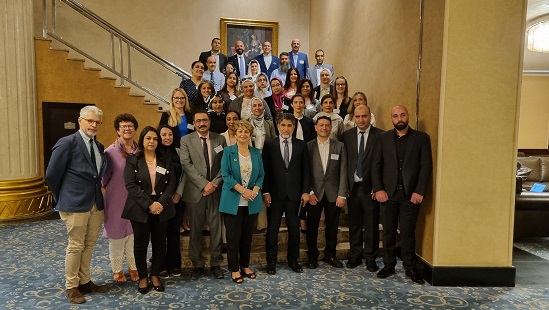
27 June 2023 – In 2019, 1.3 million people died globally as a direct result of antibiotic-resistant bacterial infections.[1] In WHO’s Eastern Mediterranean Region, all countries have developed national action plans on antimicrobial resistance (AMR), in spite of challenges resulting from political instability, conflict, inequities and emergencies. However, implementation at scale remains a challenge.
To review progress and challenges in implementation of national action plans on AMR and identify key priorities for the upcoming years, WHO staff from all 3 levels of the Organization and ministry of health staff from 8 countries in the Region (Egypt, Islamic Republic of Iran, Iraq, Jordan, Morocco, Pakistan, Tunisia, Sudan) convened at a regional meeting in Cairo on 4–6 June 2023 to review country programmes on AMR.
While countries of the Region have laid foundations for stronger infection prevention control (IPC) measures and enhanced AMR surveillance, concerted antimicrobial stewardship efforts have been limited. In all countries, most antibiotics are prescribed in primary care. Antibiotics are effectively part of the infrastructure of the health system and are often used as a substitute for good hygiene, effective IPC measures, accurate diagnosis and appropriate treatment, with unrestricted over-the-counter sales representing a major challenge.
Curbing the overuse and misuse of antibiotics is vital to reduce the number of drug-resistant infections that are compromising health outcomes and increasing the costs and complexities of care. Key activities will include the roll-out and sustainable implementation of antimicrobial stewardship programmes and adoption of the guidance for empiric antibiotic use in the WHO AWaRe (Access, Watch, Reserve) antibiotic book. Working together with the health workforce, and particularly young health professionals and students in nursing, pharmacy and medical schools, is essential. Understanding and influencing the complex and underlying incentives for health workers to overprescribe antibiotics, and patients to demand and consume antibiotics, remains a neglected area of work.
Countries also need to ensure that their national technical working groups on antimicrobial stewardship work with all relevant programmes within the human health sector as well as sectors across the animal-human-environment interface under a One Health approach. Generating and sharing quality antimicrobial consumption and use data across sectors remains imperative to create clear, country-tailored recommendations and foster programmatic action.
Most countries of the Region are initiating a review and update of their national action plans. This offers a critical opportunity to ensure that work on the appropriate use of antimicrobials and IPC is better integrated at all levels of the health system.
The renewed focus on antimicrobial stewardship also aligns with increasing political commitment to tackle AMR in the Region. During the third High-level Ministerial Conference on AMR, held in Oman in November 2022, 16 of the 22 countries in the Region signed the Muscat Manifesto and committed to tangibly reducing the use of antimicrobials in the human and animal health sectors. Next year will mark another milestone in further scaling up political leadership and mobilizing resources with both the United Nations High-level Meeting on AMR and the fourth High-level Ministerial Conference on AMR, hosted by Saudi Arabia, on the agenda.
Dr Yvan Hutin, Director of the Department of Communicable Diseases at the WHO Regional Office, reflected on the successful meeting, “After years of virtual working, it has been great to meet WHO country colleagues and government focal points in person and to have a really frank dialogue about what is working, what is not working well, and how the Regional Office can provide targeted support to address AMR in the future.”
The WHO Regional Office would like to thank the UK Fleming Fund, US Centers for Disease Control and Prevention (CDC) and Saudi Arabia for providing the funding to host this meeting.
[1] https://www.thelancet.com/journals/lancet/article/PIIS0140-6736(21)02724-0/fulltext








